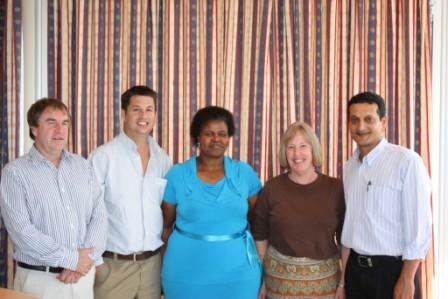
Marrying development, local municipalities and how to sustainably utilise our marine resources is what the Rural Fisheries Programme (RFP) is all about.
An important collaboration between the Local Government Sector Education Training Authority (LGSETA) and Rhodes University Department of Ichthyology and Fisheries Science, the RFP has produced a useful guide on how to sustainably utilise our marine resources.
Coastal Fisheries: an easy guide was launched recently at Rhodes University. Based on a booklet produced by the South African Institute of Aquatic Biodiversity (SAIAB) in 2005, the booklet has been updated and re-released in a new format and is geared towards assisting municipalities on the sustainable use of our coastal and inshore marine resources.
As part of the development component of the department, the RFP was approached by the LGSETA to collaborate in a series of projects geared at developing local municipalities and engaging with local traditional leaders.
Present at the launch was the CEO of the LGSETA Ntombenhle Nkosi and Janet Davies, Skills Sector Planning Manager of the LGSETA. “I am proud that the LGSETA board is involved in this project because it is important that all of us know how to sustain ourselves,” said Ms Nkosi.
“My dream, my vision is for everyone to receive training so that they can work in local government,” she added.
“Local government has such a broad mandate that if people aren’t aware of what questions they’re asking, they can’t come up with the answers. It is essential that local government realises their important role in marine resources management ? it’s about sustainability and improving people’s lives,” said Ms Davies.
Ichthyology and Fisheries Science Head of Department, Prof Warwick Sauer emphasised how important it is that Rhodes University collaborates with local government on developing ties in the Eastern Cape which “will increase the number of students from rural areas attending the university”.
He thanked SAIAB for their contribution to Coastal Fisheries and LGSETA for providing funding for the booklet. “We don’t consider ourselves as ivory towers of academia, we are consciously working on developing the province, utilising the capital set aside for these purposes,” he said.
“The RFP is the department’s development project, where our knowledge of Fisheries Science and aquaculture can be re-packaged to respond to local government needs,” said the Director of the RFP, Mr Qurban Rouhani.
Despite these drawbacks, Mr Rouhani strongly feels that, in order to conserve marine resources on a broad scale, it is imperative to engage on a local municipal level, despite challenges such as understaffing and a lack of strategic skills. The RFP has already worked with fishing communities in the Coffee Bay area in the Wild Coast. At present, there are plans for the project to go national so that all South African coastal municipalities can benefit.
The RFP was formed when it became apparent that marine resources were not being managed from a developmental point of view, despite development being a core aspect of the local mandate. With the head offices located in Cape Town, distance is also a problem.
Photo and story by Anna-Karien Otto
From left to right are: Ichthyology HOD Warwick Sauer, SAIAB Director Dr Angus Paterson, CEO LGSETA Ntombenhle Nkosi; LGSETA Skills Sector Planning Manager Janet Davies and Head of Rural Fisheries programme Qurban Rouhani.
